
Fast, affordable Internet access for all.

Language added to a New York State budget bill is threatening to undermine a municipal broadband grant program established by Gov. Kathy Hochul’s office earlier this year.
Known as the Municipal Infrastructure Program, it was designed to provide grant funding for municipalities in the state eager to build publicly-owned, locally controlled broadband infrastructure as a way to ensure ubiquitous, affordable access to high-quality Internet after decades of frustration with expensive, spotty and uneven service from the regional monopolies.
Currently, New York state lawmakers are in the midst of budget proposal season in which the Governor’s office and both legislative chambers (the state Senate and Assembly) have until April 1 to reconcile and complete a final budget for the upcoming fiscal year.
Buried near the bottom of the Assembly budget proposal (A8805B) is a Trojan horse legislative sources say is being pushed by lobbyists representing Charter Spectrum, the regional cable monopoly and 2nd largest cable company in the U.S. that was nearly kicked out of New York by state officials in 2018 for atrocious service.
Today, the first Building for Digital Equity livestream of the year will begin at 3 PM ET. The entire event will zoom in on the imminent end of the Affordable Connectivity Program (ACP) with the lineup of speakers sharing on-the-ground perspectives and approaches being adopted at the community level as they work to keep financially-strapped households connected beyond ACP.
Last minute registration are still being accepted to fill up the last few seats for the virtual gathering here.
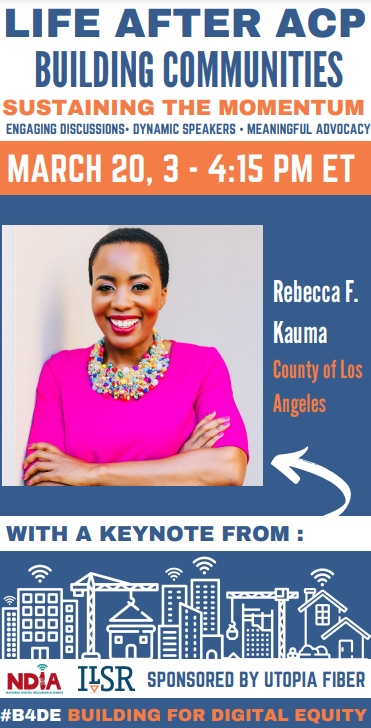
Here’s the run-of-show:
NDIA’s Amy Huffman will set the table on where things stand with the ACP wind down process before two lightning rounds take center screen.
For the first lightning round Margaret Käufer, President of The STEM Alliance, will give an overview on the short and long-term community work her organization is doing in upstate New York in the face of ACP’s demise. That will be followed by Jason Inofuentes, Program Manager for the Broadband Accessibility and Affordability Office in Albemarle County, VA, who will spotlight an ACP supplement program his office is pursuing and how they see things moving forward.
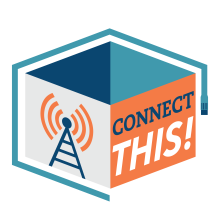
Join us Friday, March 29th at 2pm ET for the latest episode of the Connect This! Show. Co-hosts Christopher Mitchell (ILSR) and Travis Carter (USI Fiber) will be joined by regular guest Doug Dawson (CCG Consulting) and Kim McKinley (UTOPIA Fiber) and special guest Gigi Sohn (American Association for Public Broadband) to talk about whether a recent punishment by the FCC against an ISP for overreporting coverage signals an appetite for meaningful change in the challenge process, a bill amendment that would hamstring New York's Municipal Infrastructure Program, and much more.
Email us at broadband@communitynets.org with feedback and ideas for the show.
Subscribe to the show using this feed or find it on the Connect This! page, and watch on LinkedIn, on YouTube Live, on Facebook live, or below.
One year after launching a municipal fiber network, Dryden, NY officials say they’re making steady progress in their quest to expand affordable fiber broadband to the entire town of 14,500.
While the effort hasn’t been without obstacles, town leaders say the public response to their foray into broadband has been overwhelmingly positive.
“While there are challenges, we are continuing to make great progress in the buildout,” Dryden Town Supervisor Jason Leifer tells ILSR. “We have support from our residents, who continue to show interest in this project. We also have financial support from Tompkins County in the form of grants–and from neighboring municipalities who are interested in replicating our model.”
The city’s network began with a 50-home trial pilot trial in the southwest part of town. The broader $15 million network will be funded by a combination of bonds, $2 million in federal COVID-19 disaster relief funding, an Appalachian Regional Commission grant, and eventually, subscriber revenues.
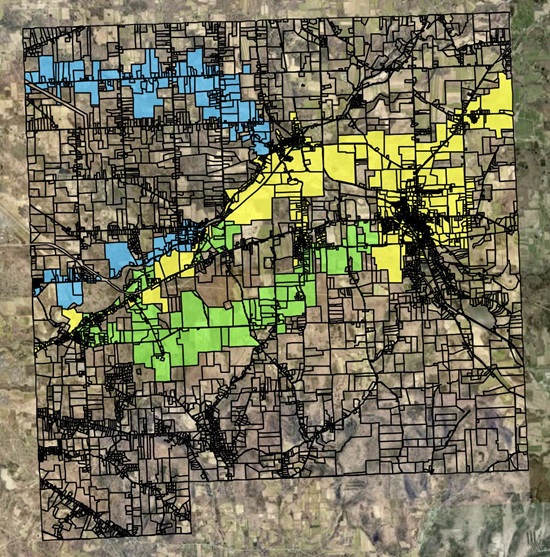
The town took a phased approach to deployment, first by connecting the backbone of the network in the southeast of the city, followed by a focus on the western and eastern halves of the municipality, respectively. The Dryden fiber website features a build map that helps locals track network progress.
“We have currently passed over 420 addresses with our buildout,” freshly-appointed Dryden Fiber Executive Director David Makar tells ISLR. “This includes over 150 rental properties – mostly single family homes and apartments – as well as many owner occupied homes and businesses. We are still in phase one, and as we move into the village of Dryden and the hamlets of Varna, Ellis Hollow, and Etna, we will be in phase two.”
Yesterday, New York Gov. Kathy Hochul announced a $228 million infusion of federal funds the Empire State will earmark for its recently established Municipal Infrastructure Program (MIP).
Created as part of New York’s billion dollar ConnectALL Initiative, the MIP is specifically designed to support municipal broadband projects, which have shown to be a viable, and increasingly popular, way to bring affordable, high-quality Internet service to an entire community.
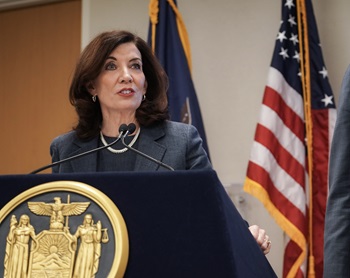
New York is a notable exception to what most other states are doing as those states prepare to funnel the lion’s share of its federal broadband funds to the big incumbent providers with scant, if any, support for publicly-owned broadband projects. In New York – similar to states like Maine, Vermont, and California – state leaders are devoting a significant chunk of federal funds, all $228 million of its recent disbursement of Capital Projects Funds, to build publicly-owned, open access networks.
“Broadband infrastructure in the Municipal Infrastructure Program will be owned by a public entity or publicly controlled, and Internet Service Providers will use the new broadband infrastructure to provide New Yorkers with affordable, high quality service options,” the press announcement said.
As the new year begins, the Institute for Local Self-Reliance (ILSR) announced today its latest tally of municipal broadband networks which shows a dramatic surge in the number of communities building publicly-owned, locally controlled high-speed Internet infrastructure over the last three years.
Since January 1, 2021, at least 47 new municipal networks have come online with dozens of other projects still in the planning or pre-construction phase, which includes the possibility of building 40 new municipal networks in California alone.
A plan in Jamestown, New York to deploy affordable fiber to every last city resident has received welcome support from state leaders, even though deployment details remain murky and network construction remains well over the horizon.
In 2021, Jamestown officials told ILSR they were working with Entrypoint Networks on a $25 million fiber network for the city of 28,000. The city hopes to deliver fiber in conjunction with the Jamestown Board of Public Utilities, leaning heavily on the federal Affordable Connectivity Program (ACP) to ensure low cost access to marginalized and low income communities.

The city’s plans got a needed attention boost last month when Empire State Development – tasked with boosting economic development across New York State – gave a nod to Jamestown’s efforts in the organization’s five-year development plan.
The plan, among other things, will shape how the state utilizes $664 million in federal subsidies made possible by the Broadband Equity Access and Deployment (BEAD) Program and the 2021 infrastructure bill. While Jamestown may qualify for BEAD funding, how much the city’s project could receive remains undetermined.
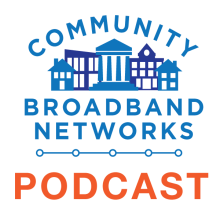
This week on the podcast, Christopher is joined once again by Sean Gonsalves, Associate Director of Communications for the Community Broadband Networks initiative.
Christopher and Sean start by discussing how a new wireless community broadband network in Syracuse, New York called Surge Link is helping the underserved households in their area. Syracuse is a prime example of how cities and towns are taking matters into their own hands by looking for ways to proactively provide affordable broadband access to their citizens right now instead of waiting for potential federal funding and local planning to align perfectly.
Sean and Christopher also unpack other recent news, including the FCC's plan to adjust the definition of broadband to 100 Megabits per second (Mbps) download and 20 Mbps upload speeds, the NTIA's Letter of Credit modifications, and the future of the Affordable Connectivity Program (ACP) with the White House asking Congress for an additional $6 billion in funding to continue the program through the end of 2024.
With ACP's future looming, Christopher and Sean finish by discussing the need and importance for a long-term solution to address the digital divide, including the financial sustainability of networks in rural areas.
This show is 33 minutes long and can be played on this page or via Apple Podcasts or the tool of your choice using this feed.
Transcript below.
We want your feedback and suggestions for the show-please e-mail us or leave a comment below.
Listen to other episodes or view all episodes in our index. See other podcasts from the Institute for Local Self-Reliance.
Thanks to Arne Huseby for the music. The song is Warm Duck Shuffle and is licensed under a Creative Commons Attribution (3.0) license.
Syracuse officials have launched a new wireless community broadband network they hope will help bring affordable broadband access to the city of 145,000.
Dubbed Surge Link, the effort is backed by more than $3.5 million in federal funding and aims to deliver free broadband access to the city’s lowest income neighborhoods.
Motivated by peak pandemic connectivity headaches, Syracuse put out a request for proposal (RFP) late last year. The city then hired US Ignite as an advisor, and selected Geneva-based Community Broadband Networks (no relation to our program here at ILSR) to build a fixed wireless network capable of delivering discounted access starting with 2,500 underserved Syracuse households.
City officials tell ILSR the network is using Fixed Wireless Access technology, specifically Citizens Broadband Radio Service (CBRS), which is an emerging technology a growing number of municipalities and other nonprofit community groups have been experimenting with as a way to bring broadband to unserved and underserved residents in dense settings. And while CBRS has promise, as US Ignite notes, “because the technology is relatively new, the hardware and software associated with CBRS networks is also new. Vendors may still be working out the kinks in their solutions, particularly if those solutions are being used in novel ways, or need to interface with other older systems.”
It should also be noted that another New York community (Westchester County) embraced CBRS, only to find that it could not deliver the capacity they wanted to many people who needed the service.
As a young woman of the Nuxalk Nation, Mallory Hans is “clearing a path for future generations.”
A 2022 graduate of the British Columbia Institute of Technology, she’s one of about 50 people hailing from various Tribes and First Nations across North America in attendance for the latest Tribal Broadband Bootcamp, a three-day intensive learning experience focused on building and running Tribal Internet networks.
Held in different tribal regions several times a year since the initiative began in 2021, this bootcamp (the eighth in an ongoing series of hands-on seminars) is being hosted at the Akwesasne Mohawk Casino Resort on the Saint Regis Mohawk reservation along the New York/Canada border.
“So far so good,” Mallory said on Day Two of the bootcamp just as the attendees broke into small groups to go through a variety of demonstration stations set up by bootcamp instructors and Tribal employees who run Mohawk Networks, which provides fiber-to-the-home (FTTH) Internet, video, and voice services across the reservation in northern New York.
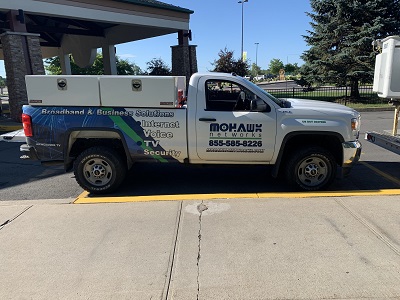
In continuing the driving impulse to demystify technologies and build capacity among cohorts in Tribal nations, Day Two was centered around fiber stations that included demonstrations of how network operation centers are run; one on fiber splicing; another showcasing equipment used to install fiber inside of households with representatives from Calix, and another station on the electronic equipment that measures the performance of fiber lines.
“I’m enjoying it, feeling more confident and finding out I’m capable,” said the 22 year-old, newly minted fiber technician.